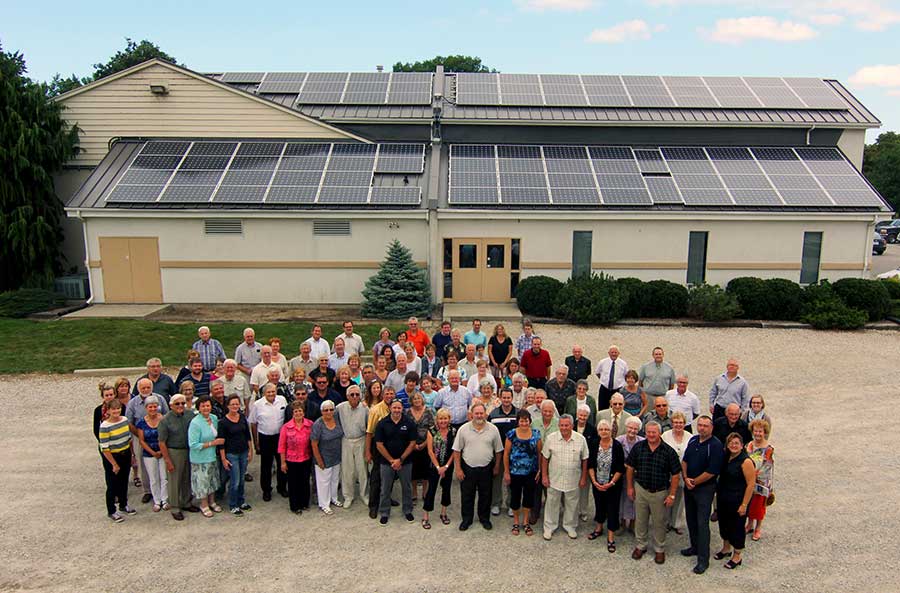Advocating for a greener Ontario through the power of solar
By Rajitha Sivakumaran
Imagine a self-sustaining “smart” home that can automatically monitor and manage its energy needs. This may sound like an invention destined for the far future, but it is already in the process of being implemented. The fuel powering this initiative is none other than renewable energy.
Jeremy DeSota, one of the co-founders and CEO of EthoEnergy, is a trusted advocate of green energy in Ontario. A graduate of the North Tennessee Bible Institute with a degree in Youth Ministry, DeSota’s vocation took an altered path when he and co-founder, Ken Rounds, established EthoEnergy in 2009.
EthoEnergy offers photovoltaic (PV) solar installations for commercial, agriculture and residential units, connecting businesses and homeowners to the grid via roof and ground mount systems. As a young entrepreneur with a powerful vision, DeSota and his close-knit group of employees have already conducted over 1,000 solar panel implementations throughout Canada and the U.S.
“EthoEnergy exists to build stronger communities through the power of solar. We really believe that both the environmental and financial impact that renewable energy, specifically solar, can have on a community will help that community on the long term, both to ensure a healthy environment for many generations as well as lower the cost of living for the next generation,” DeSota said.
The perks of going solar
Going green is a win-win situation; carbon emissions and city pollution decrease and long-term energy security stabilizes. Although Ontario is a relatively clean province, there are industrial cities like Hamilton, which serves as a hub for manufacturing, resulting in increased pollution and smog days.
“There is a huge benefit to providing the future generations a healthy, clean place to live and it also saves money,” DeSota said.
Solar energy can serve the average Canadian homeowner in two major ways: it can be a revenue-generating asset or it can help offset energy costs through net metering. In the latter scenario, the consumer becomes self-sufficient, generating the energy that they use on an ongoing basis. Essentially, the conversion to green energy is a business opportunity for the average Canadian, a 25-plus-year investment that guarantees positive returns.
Depending on size, installation can cost an average-sized home an estimated $25,000 to $28,000. The savings produced will be double this amount, whereby the revenue generated will cover the cost of the system and entail a profit of approximately $25,000 over the course of 20 years.
Solar energy serves as an insurance against fluctuations in energy costs. For instance, much of Toronto’s energy needs are supplied by the Bruce nuclear plant, the largest power plant in the world as measured by output. Grid infrastructure maintenance and energy transportation cost billions of dollars. At the moment, as any homeowner would attest, energy costs are high due to infrastructure upgrades.
With solar, however, on-site energy production cuts these costs. Over time as solar energy’s popularity increases and battery technology is implemented on a large scale, electricity usage and costs will decrease.
Several companies in Ontario offer free solar panel installations, but DeSota said, “They’re keeping the benefits of the ownership to themselves.” This is creating a problem in the real estate resale market — complications can arise if multiple parties can claim ownership to a roof. This is why EthoEnergy promotes customer ownership and encourages their clients to “own your own energy bill”. For new homeowners, DeSota recommends bypassing free installations, putting a few years of equity into their home and starting green initiatives once financial capability is reached.
A family of educators and environmentalists
A successful business led by a young entrepreneur is one unique aspect of EthoEnergy, but the company’s focus on education sets them apart.
“We believe that the value of renewable energy really becomes clear when you are educated about it. Then you will take enough pride in it to own it and invest in it,” DeSota said. EthoEnergy provides this education through a pressure-free sales process, maximizing customer engagement and knowledge.
“Earning somebody’s trust is more important than the revenue potential of the sale,” DeSota said.
With a staff base of 16 full-time employees and an indirect employment of about 50 people, DeSota described his company as a tight-knit family. Driven teamwork, trust and positive criticism are achieved through shared goals centred on customer satisfaction and constant improvement. “One hundred per cent responsibility to serve the customer well every time and zero excuses when we’re not able to deliver that expectation,” DeSota said. Hopefulness fuels the employees at EthoEnergy as they endeavour to change the world one roof at a time. The staff practice what they preach; most have solar panels on their own roofs.
Five years ago, the cost of installing solar panels was three times the current value. Now prices are dropping due to government incentives and increased investments in renewable energy. Government incentives include the Feed-in-Tariff (FIT) Program for businesses and the microFIT Program for homeowners. In both systems, consumers generate power on-site and feed it into the grid to earn a nine- to 10-per-cent return on investments annually.
Community Solar is another promising incentive. Originally started in the U.S. for homes and businesses that were unable to install solar panels on their roofs, this program utilizes a central location for a commercial-scale installation through which power is distributed to neighbouring areas. Still in its infancy in Canada, EthoEnergy is in the process of advocating for its adoption.
A regulatory risk
Regulation is the biggest challenge of the industry, imposed through governmental bodies and utility companies. In places where utilities are privately owned, renewable energy can be regarded as a threat to the business model of these companies.
“There’s a potential that if renewable energy continues to grow at the pace at which it is growing currently, there will be less need for the transmission grid and the large energy generation assets that utility companies have invested in,” DeSota said.
According to DeSota, Ontario is straggling behind due to heavy regulation. One example is the time-consuming approval process needed before residential systems can be connected, with a potential for rejection by the government due to insufficient capacity. Globally, this is very uncommon — systems that are of residential size are automatically approved.
“We’ve got a long way to go,” DeSota said, but the goal will incontestably be reached due to the innovation that drives companies like EthoEnergy.
Presently, DeSota is engaged in plans for a home, an example for the homebuilding industry, to demonstrate the feasibility of a smart energy residential unit. The model will show the costs of the technologies used and the time taken to generate profit.
“Conservation, generation through solar and storage through battery — when those three things come together, you can completely manage the energy needs of your home or business,” DeSota said.
www.ethoenergy.com







